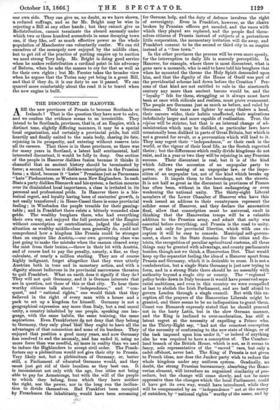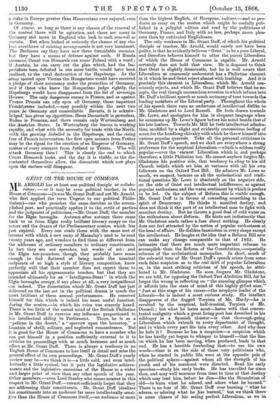THE DISCONTENT. IN HANOVER.
ARE the new provinces of Prussia to become Scotlands or Irelands ? That is the question they have now to solve, and we confess the evidence seems to us irresistible. They intend to be Scotlands, provinces, that is, of an Empire, with a ,distinct tone, slightly differing manners, it may be a special local organization, and certainly a provincial pride, but still heartily and finally united to the main body, sharing its fate, rejoicing in its prosperity, and entering without reserve into all its careers. That there is in these provinces, as there was for many years in Scotland, a latent half sentimental, half interested discontent, it would be folly to deny. One section of the people in Hanover dislikes fusion because it thinks it shameful that an ancient history should be terminated by force; a second, because it dislikes conscription in the Prussian form ; a third, because it "hates " Prussians just as Parmesans "hate" Piedmontese, or Western men New Englanders. In each State a party dislikes Bismarck and his system, a faction mourns over its diminished local importance, a class is irritated in its personal and professional pride. In Hanover there is a his- torical regret, and loyalty having been of centuries' growth, is not easily transferred ; in Hesse-Cassel there is some provincial feeling ; in Wiesbaden the people tremble for their gaming- table ; and in Frankfort there exists a bitterly wounded class pride. The wealthy burghers there, who had everything their own way, and enjoyed the full protection of the Empire without conscription or centralization, judged the political situation as wealthy middle-class men generally do, could not comprehend how a kingdom like Prussia could be stronger than an empire like Austria,—our own governing class was just going to make the mistake when the cannon cleared away the mist from their brains,—threw in their lot with Austria, and of course had to pay the penalty, namely, a fine, as they calculate, of nearly a million sterling. They are of course highly indignant, forget altogether that they were utterly Austrian both in tone and in monetary action, and with a 'dignity almost ludicrous in its provincial narrowness threaten to quit Frankfort. What on earth does it signify if they do ? They will not quit Germany, and it is German interests that are in question, not those of this or that city. To hear these worthy citizens talk about " independence," and " con- -quest," and " national rights," one would think that they believed in the right of every man with a house and a park to set up a kingdom for himself. Germany is not a geographical expression any more than Italy, but a real moral unity, a country inhabited by one people, speaking one lan- -guage, with the same habits, the same training, the same aspirations. Even Frankforters d,o not deny that they belong to Germany, they only plead -that'i they ought to have all the advantages of that connection and none of its burdens. They -enjoyed that position a good many years, and now Germany has resolved to end the anomalyi and has ended it, using no more force than was needful, no more in reality than we used -to induce the Highlanders to accept civil order. The Frank- forters say a plebiscitum would not give their city to Prussia. Very likely not, but a plebiscitum. of Germany, or, better still, a Parliament of educated Germans would, and they -must just get rid of their localism as they best can. It is inconsistent not only with the age, free cities not being able to pay for Armstrongs, but with the will of the people to which they belong, from which they have neither the right, nor the power, nor in the long run the inclina- tion to divide themselves. Had Frankfort been occupied by Frenchmen the inhabitant would have been screaming
for German help, and the duty of defence involves the right of sovereignty. Even in Frankfort, however, as the chairs broken by Prussian officers get mended, and the vases with which they played are replaced, and the people find them- selves citizens of Prussia instead of subjects of a pretentious little corporation, the momentary irritation will die away, and Frankfort consent to be the second or third city in an empire instead of a "free town."
In the other provinces the process will be even more speedy, for the interruption to daily life is scarcely perceptible. In Hanover, for example, where there is most discontent, what is gone save a monarch, who is said to have told his burghers that when he mounted the throne the Holy Spirit descended upon him, and that the dignity of the House of Guelf was part of the providential scheme laid down before the Creation ? Per- sons of that kind are not entitled to rule in the nineteenth century any more than ancient barons would be, and the "loyalty" felt for them, struggling as it always must have been at once with ridicule and realism, must prove evanescent. The people are Germans just as much as before, and ruled by Germans. Their taxes are lighter by many thalers a head, their careers wider, their habits unaffected, their aspirations indefinitely larger and more capable of realization. True, the regime will be stricter, but that is an internal change of ad- ministration which may be disliked, as particular laws have occasionally been disliked in parts of Great Britain, but which is not a ground for revolt, or a provocation which will lead to it. They may regret their "independence," or their rank in the world, or the vigour of their local life, as the Scotch regretted theirs ; but the differences which really divide kingdoms do not exist, and in a year or two they will be rejoicing in any Prussian success. Their discontent is real, but it is of the kind which follows the accession of an unpopular party to power, or the passing of an unpopular law, or the impo- sition of an unpopular tax, not of the kind which breaks up nations. It impels them to the beershops, not the streets. It is not half as great as the discontent in provinces of France has often been, without in the least endangering or even weakening the national unity. The thirty-eight Liberal members of the Lower Chamber of Hanover who have this week issued an address to their countrymen represent the solider sense of Hanover, and they declare the annexation final, allow that conscription must be universal, exult in thinking that the Hanoverian troops will be a valuable addition to the Prussian army, and admit that unity was essential before everything, and Prussia is the road to unity. They ask only for provincial liberties, which with one ex- ception it will be easy to concede. Municipal self-govern- ment, a share in the State domains for the cities and dis- tricts, the recognition of peculiar agricultural customs, all these things may be granted with advantage, and county parliaments besides, though not we think, a Hanoverian Diet. That would keep up the separatist feeling, the idea of a Hanover apart from Prussia and Germany, which it is desirable to erase. It is not a confederation, but a single State Germany is just now trying to form, and in a strong State there should be no assembly with authority beyond a single city or county. The " regional " policy broke down in Italy because it would have preserved sepa- ratist ambitions, and even in this country we were compelled at last to abolish the Irish Parliament, and are half afraid to govern London through a single council. But with this ex- ception all the prayers of the Hanoverian Liberals might be granted, and there seems to be no indisposition to grant them. Count von Bismarck expressly stated that he should proceed not in the hasty Latin, but in the slow German manner, and the King is inclined to over-moderation, has still a latent regret at the necessity of expelling a Prince who, as the Thirty-Eight say, " had not the remotest conception of the necessity of conforming to the new state of things, or of the task imposed upon him under it," or indeed of anything else he was required to have a conception of. The Cumber- land branch of the British House, which is not, as it seems to fancy, sole representative of the "sacred" race, but only a cadet offshoot, never had. The King of Prussia is not given to French ideas, nor does the Junker party wish to reduce the whole kingdom under any uniform system. Gradually, no doubt, the strong Prussian bureaucracy, absorbing the Hano- verian element, will introduce an organized similarity of pro- cedure, but the change will come slowly, and not be more oppressive than the changes which the local Parliament, could it have got its own way, would have introduced, while they will be compensated by an "independence " not at the mercy of outsiders, by " national rights " worthy of the name, and by a stake in Europe greater than HanOverians ever enjoyed, even in Germany.
Of course, so long as there is any chance of the renewal of the contest there will be agitation, and there are many in Germany rind more in England who look to such renewal as certain. But when looked at seriously the chance of any vio- lent overthrow of existing arrangements is not very imminent. The Berliners say they have now three formidable enemies. but they have a means of defence against each. If Rnsdia menaces; Count you Bisniarck can rouse Poland with a word ; if Austria; he can carry out the plan which, had the Im- perialiets been defeated in one more battler, would have been realized, ter the total destructions of the Hapsburgs. As the .armyniored upon Vienna the Huntarians'wonld haVe received a-pledge- of their autonomy under the protection of Germany, and if those 'who know' the Hungarians judge rightly; the Hapilmrgs would have diaippeated froth the list of sovereign Houses: The only dangerous enemy ieFraithe; and arr against France Prussia' can rely upon all Germany, those impatient Frankfortek-s-' included,--may possibly within the next twb. years' be Garb:Lahr and unassailable. Bavaria, it is ackndw- }edged, has-gbrentp opprisition, Hesse Darmstadt is poWeileaS, Baden - is Pribsian-, and there remain only Wurtemberg and the Austria* States. In Wurtemberg the leaven is working: rapidly, .acrd What with:the necessity frif trade with the:North, with the growing disbelief in the Hapsburgs, and the rising fear of French intervention, the first open menace from Fralide may be the signal for the' creation- of an Emperor of Gerinany, matter of every resource froth Jutland to Trieste. Who will attack Gerniang then ? This is clearly the end to which Count. Bismarck lcioka, and the day it is visible, as the dis- contented themselves allow, the- discontent which now plays upon the stirface4ill disappear.































 Previous page
Previous page